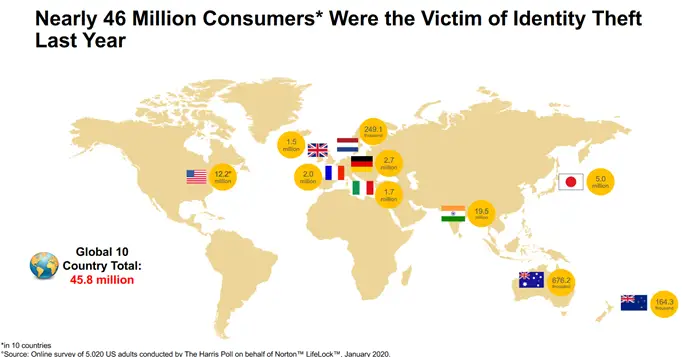A significant number of adults are concerned that their identity will be stolen. According to NortonLifeLock Cyber Safety Insights Annual Report, nearly 46 million consumers experienced Identity Theft last year. The report focuses primarily on how the influx of cybercrimes may have affected the state of millions of Internet consumers who have actively taken steps to protect their online footprint.
Nearly 46 million consumers experienced identity theft in 2019

Describing the overall situation, researchers had this to say:
“With over a third of consumers across 10 countries (roughly 350 million people) experiencing cybercrime in the last year alone, consumers are understandably concerned about their privacy and attempting to take action to protect it. However, despite taking precautionary steps, many feel it’s too late or even impossible to protect their privacy.”
39% of Indian adults have experienced Identity Theft!
As per the survey conducted with over 1,000 Indians aged 18 and above, four in every ten Indian adults have experienced identity theft. Meanwhile, 70 percent of participants were worried their identity will be stolen.
The story doesn’t end here. As much as 80 percent of participants have experienced some kind of cybercrime at least once in their lives. 94 percent of participants are so worried that they are reluctant to reveal their online footprint and activity taking steps to make sure they leave no digital traces of their actual identity on the Internet.
Facial recognition turns out to be a topic for debate among Indian adults. While 74 percent of Indians have absolutely no objections to the use of facial recognition methods in schools, 76 percent and 69 percent of respondents support the use of facial recognition among law enforcement and retailers, respectively.
However, 58 percent of Indians feel facial recognition will be abused or misused in 2021.
The study also finds that Indians have no objection to a company selling their online search or shopping history to other companies to be able to serve targeted ads in return (52 percent Indians vs 25 percent global average).
Indians are far more likely to consider companies eavesdropping on their private conversation acceptable. They are also likely to consider social media companies using their photos and videos to train Artificial Intelligence (AI) algorithms that protect users against violent content acceptable than users from any other parts of the world.
You can read the full NortonLifeLock Cyber Safety Insights Annual Report here.
Leave a Reply